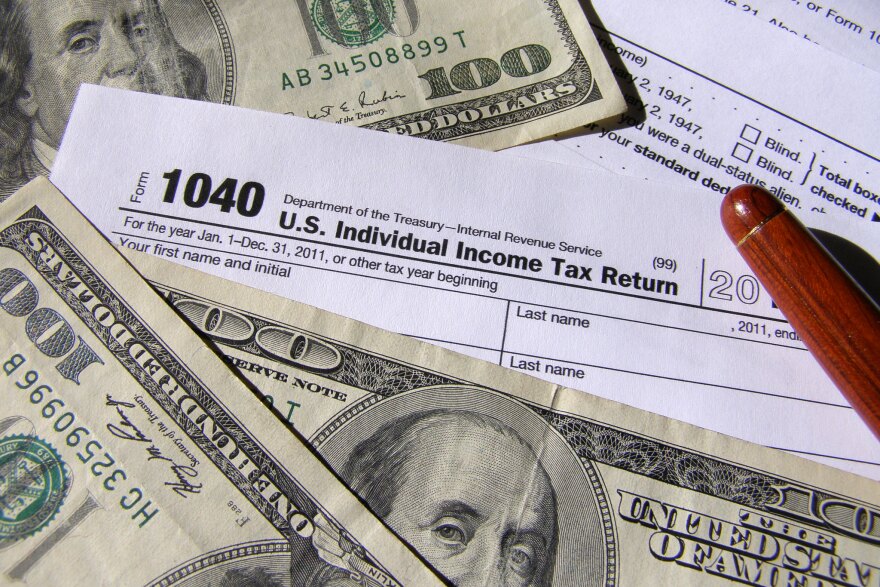Significant tax reforms, including adjustments to income tax brackets and lowering the gross receipts tax, are expected to move through the Roundhouse this year with bipartisan backing, including from Gov. Michelle Lujan Grisham. Bill Jordan, government relations officer and senior policy advisor for New Mexico Voices for Children, penned a piece called “23 Roundhouse Resolutions for 2023,” that calls for lawmakers to create a more equitable tax code — not only with an eye towards income levels, but race and gender as well. He spoke with KUNM about why a children’s advocacy organization has tax reform so high on its priority list.
BILL JORDAN: We realized pretty early on that we needed to become experts in where to get the money. And that meant taxes.
KUNM: And you are calling for tax reform that would create a more equitable system. In what ways is New Mexico's current tax structure reinforcing economic and even social inequities?
JORDAN: The best example of that is how the gross receipts tax has crept up over the years. And that, of course, is a very regressive tax, which means that it hits low-income families the hardest, because everything they earn, they spend. Wealthy folks earn a lot of money, but they're not spending it all. They're investing a lot of it and tucking a lot of it away.
KUNM: The gross receipts tax did get cut for the first time in 40 years just last year. Is that something you want to see happen again?
JORDAN: Yes, I think that there is room to do a little bit of that. When they're able to cut the gross receipts tax for everybody, everybody's a winner.
KUNM: You write about what you call "New Mexico's 2003 experiment with lowering income taxes for the rich." What happened 20 years ago? And how is it still impacting the state today?
JORDAN: The state cut the top rate of personal income taxes just about in half. So that only impacted the very, very wealthy. That not only made for less revenue, but it also meant the burden was falling much more heavily on low- and middle-income families.
KUNM: So both with income taxes and the gross receipts tax, as you just laid out.
JORDAN: Both of them. You know, the promise was, "if we cut taxes for the rich, we will generate a stronger economy and more jobs." That did not happen. And then we ended up having to cut education, health care, public safety, infrastructure dollars.
KUNM: The governor, in her state of the state address, said she supports a tax reform package. Here's what she said: "making our system more progressive, so that every taxpayer gets a fair shot and a fair shake." So, Bill, does what the governor is talking about here move the state closer to achieving the equity through the tax code that you're calling for at New Mexico Voices for Children?
JORDAN: We'll have to see what is actually proposed. But I do believe that most of the conversation is about lowering the personal income tax rate for low- and middle-income families and raising the income tax rate for the very, very wealthy. It would restore a good bit of equity into our tax code, yes.
KUNM: As a package of tax reforms moves through the legislature, you're calling for a racial and gender impact analysis of each bill. What would that look like?
JORDAN: We need a tax system debate that includes "who's going to pay? And who's going to benefit?" Not just by income category, but also by race and gender. We didn't set out to create a tax code that punished families of color, but that's kind of what we ended up with. And so, as we make reforms, we just need to be asking those questions so that we don't fall into that again.
KUNM: Does the New Mexico Legislature have the staffing capacity, the expertise to do this work currently?
JORDAN: Well, no. I mean, that's a whole other debate that is going on, that the Legislature is not staffed to do this kind of work. I would say that our Tax and Revenue Department is very well equipped. They do that kind of analysis. And when they testify on bills, if they have information that relates to equity, they share that information as part of the analysis.
KUNM: Last year, New Mexico enacted its own state Child Tax Credit. Obviously that aligns with your mission at New Mexico Voices for Children. What are you all hoping the legislature is able to do to build off of that?
JORDAN: It is a little bit small, and we are really hopeful lawmakers will increase the credit amount per child, and to begin to get serious about addressing child poverty.





